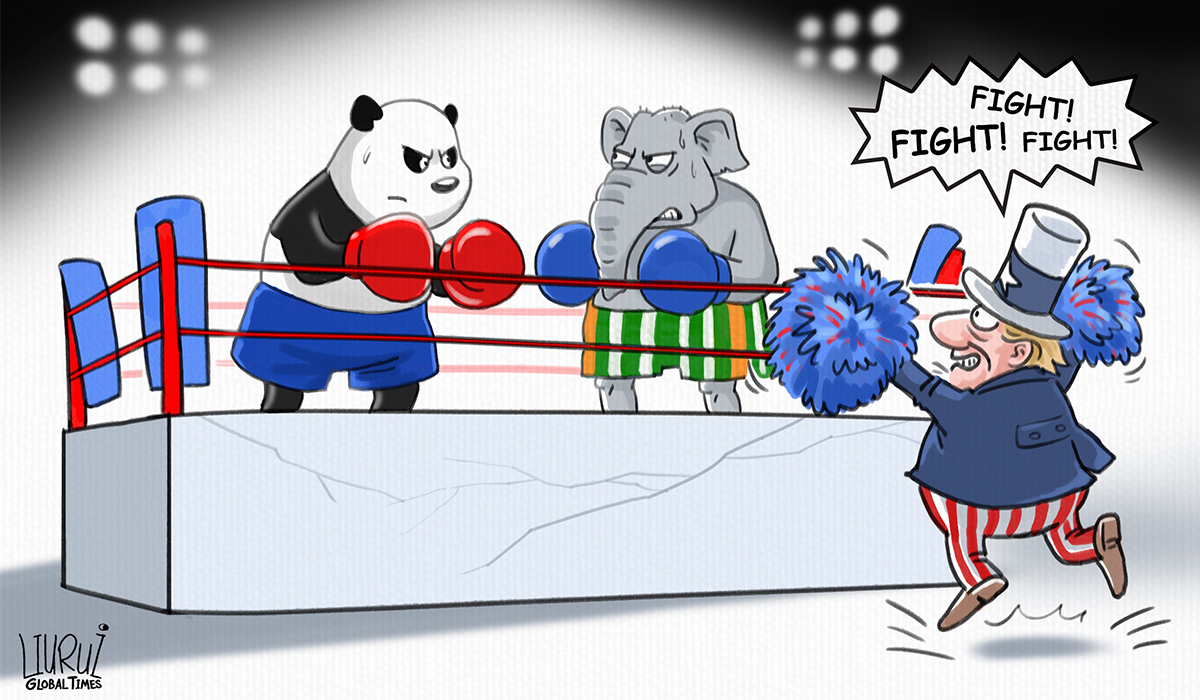
With an undisguised glee, Uncle Sam is nudging India into further spats with China. Illustration: GT
When referring to India, US officials are prone to use the word "like-minded" to advance its agendas, and so does US Deputy Secretary of State Wendy Sherman. During her visit to India to attend the India Ideas Summit on Wednesday and Thursday, the US diplomat said, "We will challenge China where we must - where it undermines interests of ours and our partners and allies or threatens rules-based international order," adding that the US and India are "like-minded" in that regard.
Apparently, Sherman is trying to soothe India's nerves. Just last month, the US formed a new trilateral defense partnership with the UK and Australia, all of which have Anglo-Saxon ancestry. In the eyes of the US, allies are ranked into different classes. While it views English-speaking countries like the UK and Australia as real allies, allies such as Europe and Japan are more like stakeholders. As for India, it is just an anti-China frontier created by the US - the US does not truly trust India, nor will it care for India's interests.
India must have noticed the signs of easing of China-US relations in the last few days. US Trade Representative Katherine Tai said in a speech on Monday that the US will hold "frank conversations" with China on trade in the near future. On Wednesday, Yang Jiechi, Member of the Political Bureau of the CPC Central Committee and Director of the Office of the Central Commission for Foreign Affairs, met with US National Security Advisor Jake Sullivan in Zurich, Switzerland, which analysts generally believe was productive. As the Biden administration's China policy is becoming pragmatic, India's position seems to be embarrassing.
In April, the US Navy carried out a transit through India's exclusive economic zone without requesting India's prior consent. It was also around that time that India was experiencing a new round of coronavirus crisis, but the US remained selfish and indifferent toward India's desperate need by refusing to supply more vaccines to India or lift the embargo on the exports of raw material needed to ramp up vaccine production in India. What's worse, the US has been imposing pressure on India over its purchase of the Russian S-400 missile system. During her India visit, Sherman described the system as "dangerous" and "not in anybody's interest," indicating the looming possibility of sanctions.
Besides strategically countering China, another much touted concept that binds the US and India together is their so-called values including democracy and human rights. But does the US really endorse India's practice of these values? In March, the US State Department released the Country Reports on Human Rights Practices for 2020, in which it criticized India's human rights abuses. During his visit to India in July, US Secretary of State Antony Blinken warned India not to backslide on democracy.
India's level of democracy and human rights obviously does not meet US standards, but it is something the US could exploit to demand India to make concessions in economy and trade and cooperate with it in containing China. The US-India relationship is a deal in essence, not as graceful as the two sides boast.
Long Xingchun, a senior research fellow with the Academy of Regional and Global Governance at the Beijing Foreign Studies University and president of the Chengdu Institute of World Affairs, told the Global Times that it is up to the US' deeds, rather than words, to test whether the US views India as a partner or pawn.
"Will the US give preferential treatment to Indian goods? Will the US provide convenience to Indian IT professionals who go to work in the US? Will the US encourage its manufacturing to transfer to India to boost India's economic development? Will the US respect India's autonomy in purchasing weapons?" said Long. "Indian politicians should be wise enough to tell India's true status and weight in US strategy."




